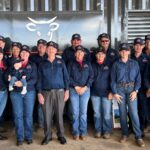The Australian Wagyu Association (AWA) invites members to take an active role in shaping the future of Wagyu by becoming a Contributor Herd in the AWA Progeny Test Program (AWA-PTP).
As the world’s most comprehensive Wagyu progeny test, the program underpins the genetic evaluation pipeline that drives the accuracy of EBVs, advances Wagyu breeding technologies, and delivers world leading insights for producers. By contributing, you directly support the development of benchmarks that will benefit the entire Wagyu sector, while gaining unique benefits for your own herd.
Why Become a Contributor Herd?
- Access to cutting-edge genetics insights – Contributor herds gain firsthand access to the latest progeny data, carcase results, and performance measures.
- Enhanced herd value – Benchmark your genetics against industry wide results and strengthen your herd’s position in the marketplace.
- Shape the future of Wagyu – Your herd’s participation directly influences the accuracy of EBVs and ensures that the Australian Wagyu herd continues to lead the world in genetic improvement.
- Drive genetic progress – Contributor herds are part of a collaborative, industry defining project that leverages collective investment to deliver benefits across the Wagyu value chain.
- Early access to next-generation genetics – Trial the newest sires in your herd before they are widely available, providing your program with a competitive edge.
- Collaborate with leading industry partners – Gain exposure and work alongside some of the most influential breeders, researchers, and service providers in the Wagyu industry.
- Access specialised reproductive services from Diamond Corporate Partner, Wise Repro FIND OUT MORE
The Impact So Far
The AWA Progeny Test Program, now in full stride, is already delivering game-changing outcomes:
- 5,550 cows AI’d across 4 cohorts
- 2,243 calves registered so far
- Completion of the first slaughter program for Cohort 1 males.
- Integration of carcase data into BREEDPLAN evaluations, sharpening EBV accuracy.
This momentum is only possible with the ongoing involvement of committed members. By joining as a Contributor Herd, you help to expand the reach and impact of the program, building greater data depth and stronger outcomes for the entire industry.
Find out more about the AWA-PTP in this factsheet
How to Get Involved
For AWA Australian members with registered cow herds, contributing is simple, but the impact is profound. Whether you run a large breeding enterprise or a smaller Wagyu operation, your herd can play an integral role in advancing Wagyu genetics globally.
Together, we can continue to be the world leader in innovation and delivery for the Wagyu sector and secure long term genetic gains that benefit every breeder, every herd, and every market.
For more information contact Genetic Improvements Project Manager, Natalie Poole E: [email protected] or Ph: 02 8880 7708
 Don’t just take our word for it, find out from Sunland Cattle Co. why they are involved with the AWA-PTP as a contributor herd. Sunland has been involved in the Australian Wagyu Association Progeny Test Program (AWA-PTP) from the beginning, and currently into their fourth year of joinings as a contributor herd, having produced 440 progeny from the first 3 cohorts. The AWA PTP is run in conjunction with their own breeding programs with the progeny produced, grown and backgrounded the same as all other Sunland progeny. READ MORE
Don’t just take our word for it, find out from Sunland Cattle Co. why they are involved with the AWA-PTP as a contributor herd. Sunland has been involved in the Australian Wagyu Association Progeny Test Program (AWA-PTP) from the beginning, and currently into their fourth year of joinings as a contributor herd, having produced 440 progeny from the first 3 cohorts. The AWA PTP is run in conjunction with their own breeding programs with the progeny produced, grown and backgrounded the same as all other Sunland progeny. READ MORE
